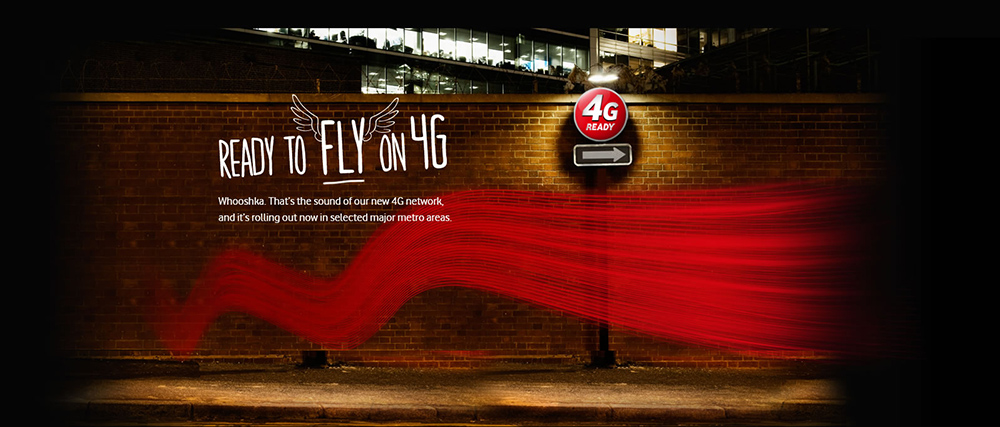
Ausdroid has had the privilege of playing with Vodafone’s 4G network for the last week. Here’s what we found.
Late last week, Vodafone approached us and asked Ausdroid would like to take part in a secret project. With not much more information than this, we of course accepted, and within a short while we found out we’d have a (relatively) exclusive opportunity to have a play with Vodafone’s new 4G/LTE network before it became open to the general public. We were invited to take a trial device, travel around wherever we wanted, and see how the network performed.
I have to say, I’ve been impressed. Sitting here at my desk typing this review, I don’t have 4G. This isn’t all that surprising; Hornsby is considered the northern fringe of the Sydney metropolitan area, and it was only recently (maybe the last month or so) that Telstra’s 4G coverage extended up this far. For a brand new network, I wouldn’t expect there to be 4G here, just yet. However, it wasn’t long ago that my partner had an iPhone 5 on Vodafone, and had slow, unreliable signal in our apartment, to the point that the iPhone was returned and the contract cancelled.
I was, perhaps understandably, a skeptic. I’ve been burned by Vodafone before, and unfortunately for Vodafone, my experiences of the past have hardly been unique. Over the past couple of years, Vodafone has received a bit of negative publicity centring — largely — on the inadequate performance of their network. It was this experience (back in 2010) that moved me to sign with Telstra, and I’ve been there since.
However, Vodafone’s network has changed quite a bit since those times, and as a bit of time has passed, I was prepared to approach this with an open mind.
While I don’t have 4G at home, Vodafone’s network is giving me a strong HSPA+ network connection, which is performing nice and swiftly at a respectable 5.6mbps downstream, 1.3mbps upstream and only 69ms latency. Using the same network connection, my HTC One on Telstra is achieving a slightly faster downstream rate of 9.8mbps, a slightly slower upstream rate of 1mbps, and a slightly quicker latency of 48ms. In real world usage, there’s very little between the two.
Flick the Telstra handset over to LTE and repeat, and the results are curiously not much different — 12.8 mbps down and 2.85 mbps up, and latency the same at 50ms. We’re in a fringe area here, and as soon as I move somewhere with stronger signal, Telstra’s performance really opens up the taps. Speeds of up to 30 mbps in either direction are not uncommon.
To my mind, Vodafone had to be able to match this to be a worthy contender. Let’s see how they went.
- 4G speeds can be fast, and I mean damned fast. I’ve seen speeds up to 65mbps downstream. Insane.
- Performance was at least on par with that observed on Telstra, and in many instances, better.
- Coverage is surprisingly good, considering this is a newly launched network. I expected less.
- Improvements to Vodafone’s 3G and 3GPlus networks are obvious; the coverage there is awesome and rather fast too.
- Network performance was inconsistent; in some places, 4G/LTE was slower than 3G, and while downstream speeds were fast, upstream speeds were slower — the fastest was 22mbps, and the average was around 6mbps.
- Coverage wasn’t everywhere I wanted it. Not at home, and not at work in the Sydney CBD. However, it wasn’t far away.
Coverage
During my limited time with Vodafone 4G, I tried to get around a good few areas of Sydney, predominantly around the north shore and north west, but I managed to work in a few trips to the office and out to south western Sydney, and I have to say I found 4G coverage in most places. In those areas that there wasn’t 4G, I had virtually continuous 3G/HSPA+ coverage with fairly quick network performance. I wasn’t able to find anywhere that Vodafone’s network completely failed on me, certainly not in places that it had done in the past, including right here at home. This certainly boded well.
Everywhere I went, I had good performance, both for voice and data usage. This really shouldn’t be remarkable, and it isn’t — in my mind, a network that can’t deliver these things isn’t even worth talking about, and indeed, it’s only notable in reviewing a network service when these things don’t work.
I’ve prepared a map of the speed tests I conducted (you can see these results below) so you can get an idea of what tests were performed where. This should give you a reasonable picture of Vodafone’s real-world 4G coverage in and around Sydney:
View our Vodafone 4G performance map in a full screen map
Carrying around two phones for the past week has been a bit of a chore, but it has allowed me to do a direct comparison between Vodafone’s network and Telstra’s at whim, and I don’t think I’ve come across any situations where I could honestly say I was disappointed with the Vodafone service. Telstra is far from a benchmark, and their network is known for its own issues, but it certainly provides a good point of comparison. In most places that Telstra had 4G coverage, so did Vodafone, with one or two exceptions. In most places that Telstra didn’t have 4G, neither did Vodafone, though there were a few places where Vodafone did and Telstra didn’t. Equally, there were a good few places (including home and work) where Telstra had 4G service and Vodafone didn’t.
The beauty here is that Vodafone offers its new and upgrading customers a network guarantee, and so once the 4G network becomes available to new signups in July, you can sign up for a Vodafone 4G service and try it out in the places that matter to you. If you don’t get 4G at home or work, and you’re expecting to have that, then you can cancel the contract and had it back. Simple.
Telstra, on the other hand, advertise no such service. Then again, they probably don’t need to.
Speed
Vodafone’s own advertising material suggests that their 4G network should best those of Telstra and Optus. Why? Simply put, they have more bandwidth. They state:
Vodafone’s unique 2 X 20MHz contiguous spectrum holdings mean the company is among the first in the world to offer these speeds, outpacing competitors in all of the five mainland capital city areas today. Launching in selected metro areas of Sydney, Perth, Melbourne, Adelaide, Brisbane; and Newcastle and Wollongong, Vodafone’s wide-band 4G network is set to treble by year’s end.
Contrast this with Telstra, which has between 10 to 20 MHz of spectrum in its coverage, and Optus which has around 15 MHz (depending on site), and you can immediately see that with up to 40 MHz of spectrum to play with, Vodafone has an advantage. But all this talk of megahertz and megabits is a bit dull. What really matters is how fast your service is and what it means for you, and in this, Vodafone’s 4G network is kind of rad.
Consider this table below which shows the download time for a 100 megabyte file on various network technologies. While 4G LTE isn’t the fastest, if you exclude a 100 Mbit LAN connection — which, let’s face it, you can’t carry around with you everywhere — LTE is looking damned impressive, faster than most home network connections:
| Connection type | Download speed | Download time |
|---|---|---|
| Modem | 28.8 kbit/s | |
| Modem | 56.6 kbit/s | |
| ADSL | 256 kbit/s | |
| ADSL | 512 kbit/s | |
| ADSL | 1 Mbit/s | |
| ADSL | 2 Mbit/s | |
| ADSL | 8 Mbit/s | |
| ADSL | 24 Mbit/s | |
| LAN | 10 Mbit/s | |
| LAN | 100 Mbit/s | |
| Turbo 3G | 7.2 Mbit/s | |
| Vodafone 4G | 50 Mbit/s |
This table isn’t just fanciful, it’s fact. These kind of speeds to bear out, and they are accessible and available to users of Vodafone’s 4G network in most places that it’s available. I conducted some 35 speedtests across a number of sites aorund greater metropolitan Sydney, and my findings are summarised below:
Vodafone Network Performance
| Downstream Speed | Upstream speed | Latency | |
|---|---|---|---|
| Minimum | 1.79 mbps | 0.04 mbps | 920 ms |
| Average | 27.27 mbps | 6.67 mbps | 103 ms |
| Median | 22.09 mbps | 4.22 mbps | 55 ms |
| Maximum | 63.53 mbps | 22.85 mbps | 23 ms |
Note: With speed, bigger is better. With latency, lower is better.
Compared with Telstra 4G
For comparison, I achieved the following results from Telstra from a smaller sample set (around 16 tests) because I wasn’t really out to test Telstra’s network, I just wanted a bit of a comparison point.
| Downstream Speed | Upstream speed | Latency | |
|---|---|---|---|
| Minimum | 5.13 mbps | 0.24 mbps | 69 ms |
| Average | 24.53 mbps | 11.50 mbps | 44 ms |
| Median | 20.77 mbps | 12.59 mbps | 40 ms |
| Maximum | 54.76 mbps | 23.65 mbps | 32 ms |
As you can see from these two tables, there’s a few observations that are fairly obvious:
- Vodafone had a higher maximum speed – 63.53 mbps compared to 54.75 mbps on Telstra
- Vodafone’s average download speed was higher – 27.27 mbps vs 24.53 mbps on Telstra
- Vodafone’s upload speeds were lower across the board — an average of 6.67 mbps vs a higher 11.50 mbps on Telstra
In real world usage, what does this mean? Simply put, where you’ve got Vodafone 4G coverage, there’s a fairly good chance that you’re going to have excellent data speeds, that are at least as good as Telstra’s 4G network (which has been operating for at least twelve months), and in many instances, better. Where Vodafone’s network falters is in upload performance, and this is going to hurt if you’re uploading video files to Youtube or sending large emails. With today’s smartphones, it’s so easy to shoot videos and high-res photos when you’re out and about, and there’s a multitude of ways to share this content with people. With lower upload speeds, sharing this content is going to take longer. However, there’s a reality check required here.
A 50 megabyte video is going to take around 38 seconds to upload, assuming ideal network conditions, on a 11 megabit upload pipe. On a 6 megabit pipe, the same upload will take a little over a minute. Yes, in a numerical sense, it’s almost twice as long. In reality, it doesn’t really matter if your upload takes 30 seconds or a minute. Either way, you’re still uploading a large file very, very quickly, and in many instances, a hell of a lot faster than you’d be uploading it if you waited until you got home and uploaded via your home internet connection.
Still, I digress.
The reality is simple — Vodafone’s 4G network is damned fast, and deserves its buzzword of ‘whooshka’.
Vodafone
- 2G – Covers 94.5% of the Australian population
- 3G – 850 MHz – covers a lot of places
- 3G – 900 MHz – so does this!
- 3G – 2100 MHz – covers mainly metro areas
- 4G – 1800 MHz – 4G/LTE network that we tested
Want to see what kind of networks operate in your area? Check out Vodafone’s coverage checker.
The deployment of Vodafone’s 4G network brings it on a level footing with Telstra and Optus, at least on a technological basis. While our initial tests show it to be a speedy network, it’s worth remembering that actual speeds on a network loaded with real world customers will likely trend downwards but still be on the fast side.
As with any new network rollout, questions persist over coverage with many areas showing “outdoor” coverage only. We’ll be keeping a keen eye on the pace of the rollout, and you should too if you’re considering making the switch.
If you’re a current Vodafone subscriber with a 4G-capable phone, you’ll be brought onto the network over the next few weeks. If you’ve been enticed to switch however, new customers won’t be able to connect to 4G until July.




Given their has not been 1 intelligent comment response re my revealing that vodafone hasn’t actually released 4G and the so called launch is a publicity beat up. I suggest that Ausdroid put vodafone to task. “It seems that vodafone are playing it real safe with 4g deployment.Readers who have now been switched on in Melboiurne please let us know what you think of this new 4g lte.I would expect at least 30 different responses to this query if there is any sort of real deployment.”
@Joshua Hill .. A couple of questions for you, friend. Would you or wouldn’t you use Vodafone ? And why ? Reason for asking is that I have just been given a phone from work (Telstra Network) but I don’t want to give up my personal number. I will still use this number for private calls/weekends but now need to move away from Telstra to try and save some money. BTW, I have looked at Vaya as well as TPG and both have their Pro’s and Con’s. So you personal opinion ?
I’ve never used Vodafone as far as I know. I was with 3 mobile a long time ago (they might have been using Voda’s network then, not sure, either way the 3 mobile reception and service was fine). If they had a good deal I would consider using Vodafone but I would want a trial period to test my experience with their network, given voda’s past problems. My concern with comments on this article is ex or current vodafone customers appear to be letting their past problems come through on comments here and I am trying to provide some rational/logical/analytical… Read more »
Thanks for your thoughts. I like your idea of “try-before-you-buy” so I will ask Vodafone if I can try their network for a month or so prior to bringing my business across. I love NextG but it is a bit too expensive for my liking. I might see if Optus will also give me a trial Sim. I understand your frustration about most of the commentators but I try to stay out of those arguments. I found out from my wife that I never win those arguments so I now stay away from them. 🙂
It seems that vodafone are playing it real safe with 4g deployment.
Readers who have now been switched on in Melboiurne please let us know what you think of this new 4g lte.
I would expect at least 30 different responses to this query if there is any sort of real deployment.
Why would you listen to what they say? If it doesn’t conform to your pre-conceived notions you’re going to dismiss it anyway. Assuming this is the same Jeff as above. I can’t tell as people insist on commenting as guests. If not, then my apologies.
Josh honey, your slip is still showing.
Jeff.
Thought it was you. You must like whatever I’m showing if you keep looking :p
I don’t care so much how long it takes to upload files, but what I’m interested in is how the lower upload bandwidth affects skype video and audio.
If I get the opportunity I’ll test this and see how it works. Be mindful though that Skype usually works fine over a fairly small pipe.. Skype on a home ADSL1 connection for example, with only 384kbps upstream, is quite usable. Vodafone with ~ 2mbps upstream is going to be pretty good you’d imagine.
Good article, Chris.
It’s nice to know that Vodafone has been investing a lot of money on their mobile network. I like the idea of having three major network providers to provide competition. It will be a sad day for consumers if Vodafone pull out of the market as the other two will surely jack up the prices.
This looks like Vodafone’s written article 0_o
You obviously didn’t read it because the author clearly detailed their previous problems with the Vodafone network, something a Vodafone written article would gloss over or not mention at all.
So u mean u dont have any problems NOW? thats itself makes it……i just moved out of vodafail and i’m glad of my decision 🙂
I’ve never used Vodafone. I was talking about what the author actually stated in the article. What are you talking about???
I could tell given the the bias and general lack of any sense to your comments that you were a Vodafone customer.
1) You were testing a 4G network without other people using it – no congestion! And comparing it to Telstra with other people using the network. How is that a valid test?
2) Where is the proof that vodafone’s network has improved since 2010? I only left vodafone for telstra 2 months ago, due to poor coverage, and congested networks even when there was coverage.
1) It’s a valid test because the author pointed that out although they could have been more explicit and what other option did they have to do a comparison test???
2) Not sure what sort of proof you want. I don’t think it’s possible to get, definitive scientific proof of this but if you’d bothered to read the article the author has past experience with Vodafone’s network problems and seems to think they’re a lot better.
1) It’s certainly a “test”, its not a valid test. Apples and oranges fallacy. Just because there was no other option for a valid test doesn’t make this test valid. I think it is pretty obvious what the problem is, if you can’t see it, I can’t help you. 2) What sort of proof would I want? How about proof that matters to ME. When I use vodafone, (I was a vodafone customer for 6 years, ending 2 months ago) i did not notice any improvement since 2010. Proof to me would be that when I use vodafone, i notice… Read more »
It’s pretty obvious you got burnt by Vodafone and your bias is the problem.
lol, so my personal experience of vodafone is biased, but presumably you think the article writer’s personal view is objective? I congratulate you on being able to recognise bias, I hope that you can get past your own bias to see that this article provides no objective proof that voda has improved, and no valid test of the speed of voda’s network versus that of telstra’s.
More objective than you? Yes.
‘No objective proof’, ‘no valid test’, you’ve already accepted my claim that it is impossible to provide this yet you keep asking for it. The readers here can judge for themselves.
P.S. Apart from you arguments not holding water it helps you to be taken more seriously if you sign up as something other than a guest.
Ok, so:
1) you think there is such a thing as “more objective”,
2) you think that I’ve accepted your claims.
3) you think that whether or not someone is a guest is relevant to whether or not to take what they are saying seriously.
I think the problem here is with the way you think.
1) I think the author is more objective than you. I think everyone that can read can see that.
2) ‘Just because there was no other option for a valid test’. Your words, remember them? Yet you insist on an impossible to perform test!
3) If you were not a guest users could check your history and see if you are always this non-sensical, biased, trolling (whatever it is your doing) or just having a bad day.
The problem here is that you think you can think!
Overheard in a cafe last night: “What’s wrong with Vodafone? It’s fine for me”
That’s what I would have thought. Congestion affects 4G networks big time… I remember reading initial tests of Telstra’s 4G network getting crazy speeds too, but once 4G handsets got spread throughout their customer base, speeds reportedly dropped to around 20% of their launch speed. Still fast (and much faster than 3G) but not insane. My guess is that Vodafone has a significantly lower percentage of customers with 4G capable handsets than Telstra and Optus too. Now that their 4G network is active (and they aren’t just using Optus in areas) they’ll probably start pushing them a little harder. I… Read more »
hi Chris, Theres NO proof that vodafone has switched on 30,000 customers. The only evidence seems to be a few coveted “free tickets” to industry media savvy favourites. Vodafone upto 12th of June said it would be activating 4G in June .They have. But it seems thats only partly true for what may be a majority of its customers. They have NOW revealed that their customers will have to wait to mid July before having 4g activated. They haven’t given any info on frequency of releases and no’s. Whats the big secret. So the false impression promoted by vodafone over… Read more »
I can’t find any mention of the author making any claim about 30,000 customers. Maybe the article has been edited? Not sure what you talking about @dfc35c97c3a47c9d0a9cbb788d382a61:disqus?
Hi Josh, reading more widely helps. I make no claims that Chris says anything. Hope that clarifies your missunderstanding. Thanks again for your insight.
I suspected you weren’t but that’s certainly the way your rant comes across. How else would you interpret an opening sentence like ‘hi Chris, Theres NO proof that vodafone has switched on 30,000 customers’. Learning to communicate effectively helps. Hope this clears up your confusing rant for other readers.
Your very welcome for my wonderful insights 🙂
Now now josh, your slip is showing.
When I have no defence to criticism’s / humour made about me I throw away useless lines too 😀
Hey Josh, Just relax buddy! Deep breaths…….better? Now I’m sure Chris can fight his own battles without his personal attack dog. Just sayin………
Bob, sign up as someone other than a guest and I might listen to what you say, better yet get a life instead of interrupting discussions with nothing useful to say. Thanks for your heartfelt advice.
Josh, honestly, do you even lift?
No when I have guests telling me I’ve got a wardrobe malfunction 😛
Hi Josh,
That’s the wrong “your”.
You’re welcome 🙂
Alex
Was editing that as you message came through. Must be a slow day for you 😉
There are definitely members of the public (not just “industry media savvy favourites”) who’ve been using the network since Wednesday.
I’ve heard anecdotally that customers are being turned on based on the 4G coverage around their billing address. This doesn’t seem like the greatest criteria on which to base such decisions (who stays at home all day?), but there you go.
Vodafone has said they’ll be migrating existing customers onto the network in the next few weeks. NEW customers won’t get it until July.